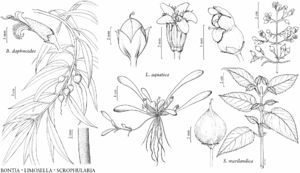Limosella aquatica
Sp. Pl. 2: 631. 1753.
Annuals solitary or mat-forming. Leaves clustered, usually rosulate; blade spatulate to linear, (1.5–) 3–10 (–20) × 0.5–3 cm, young leaves auriculate at base. Pedicels spreading in fruit, (0.04–) 2–6 cm. Flowers: calyx often purple spotted between lobes, lobes 1 mm, tube 1–2 mm; corolla white to pink, rarely pale-purple abaxially, 2–3 mm, lobes acute; stamens attached at different levels; style 0.2–0.4 mm, entire or 2-lobed. Capsules ellipsoid to globular, (2–) 2.5–4 mm. 2n = 40.
Phenology: Flowering Apr–Oct.
Habitat: Periodically flooded mud of streams and ponds, estuaries, vernal pools.
Elevation: 0–3200 m.
Distribution
Greenland, Alta., B.C., Man., Nfld. and Labr., N.W.T., Nunavut, Ont., P.E.I., Que., Sask., Yukon, Alaska, Ariz., Ark., Calif., Colo., Idaho, Minn., Mo., Mont., Nebr., Nev., N.Mex., N.Dak., Oreg., S.Dak., Utah, Wash., Wyo., Mexico, Europe, Asia
Discussion
Limosella aquatica grows primarily in fresh water; it has also been found in brackish and alkaline water. Leaves are usually spatulate; narrow-leaved plants occur throughout the range. Narrow-leaved plants in the southwest have been called L. pubiflora; there are no consistent characteristics to distinguish L. pubiflora from L. aquatica. Narrow-leaved plants in the western United States have been called L. acaulis Sessé & Mociño; these specimens do not match true L. acaulis. Clasping leaf bases are best seen on young leaves.
Selected References
None.
